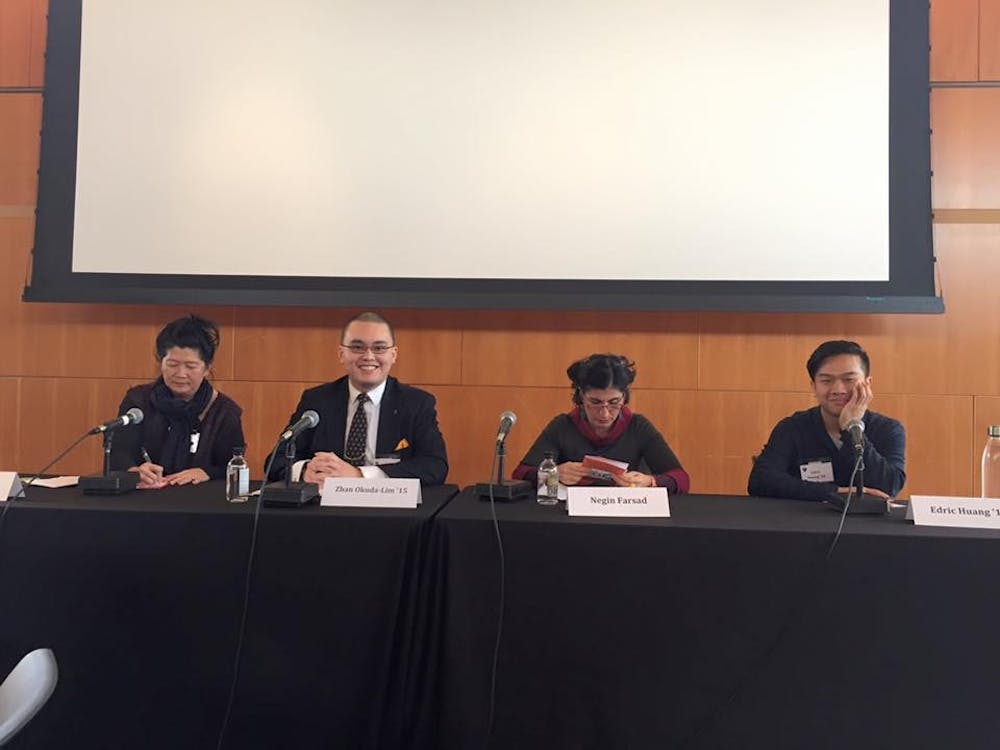People in relationships form the heart of social movements, Hali Lee '89 said at a Saturday panel in the first Asian in America conference hosted by the University.
Lee founded and directs the Asian Women Giving Circle, the first and largest giving circle in the United States led by Asian-American women.
She noted that early Asian-American activists sought to connect as allies with other civil rights advocates. The collaborations allowed Asians to transition away from the isolated areas or ghettos, like Chinatowns, that initially housed them.
"Humor and levity and connectedness even in face of bad, dire things is really important," she said. Such lightheartedness propels social movements ahead. Recently, she noted, some mobilizers have been knitting cat-eared hats, which they will wear to mock President-elect Donald Trump's comment that women should be grabbed "by the pussy."
Lee defined activism as doing something to create change. The question for everyone is what that change should be, she added.
"People, all of us, have power — multiple levers of power. Use that power to be the change you want to see," Lee said.
Activism can come in many forms, including resisting, being a warm body at a demonstration, writing emails and sending letters, showing more kindness, volunteering more, and giving more money, she explained.
Donating money represents a common American form of activism, drawing seven out of ten Americans — more than the number who volunteer or serve in the military. They just need to channel that practice into the right causes, Lee said.

Fundraising may prove harder in some Asian-American contexts. When she worked at the Korean American Family Services Center, which helps victims of domestic violence, many leaders in the community denied that such abuse existed there. Others refused to speak about it to avoid embarrassment. Some supported the Center privately but never publicly.
The Center acquired most of its money from the government and wealthy white foundations, Lee said. She encouraged the audience to help change the perception of philanthropists as a rich white man or family.
Comedian Negin Farsad urged activists to avoid taking offense too easily.
"One of the worst things that's happened since Twitter is the growth of rage," she said, referencing the assumption that anyone raising culturally insensitive questions is bigoted. This knee-jerk reaction fails to help justice, she said.

In her case, as a Muslim, she frequently receives the question, "Why don't Muslims denounce terrorism?" She explained that she answers every time because nobody else is answering. Each activist must fill that role, Farsad said.
Zhan Okuda-Lim '15 said activists should think about others.
He recalled pushing from sophomore through senior year for more mental health resources on campus through the Undergraduate Student Government.
Counseling and Psychological Services came up only once during his freshman year, when his Residential College Adviser mentioned its number to call in case of emotional turmoil. Other students frequently told Okuda-Lim they feared that speaking with CPS would result in a forced withdrawal from the University.
"I was not the only person on campus who needed to get help, or needed to know help was available," Okuda-Lim said. "Just about everybody on campus, at some point or another, experiences or knows somebody who experiences depression, anxiety, severe stress, or some other mental health issue." Over 1,500 students visit CPS every year and the number is rising, he added.
Because of his personal struggles with suicidal thoughts, he dedicated himself to battling bureaucracy, entrenched tradition, and other obstacles so as to reduce the stigma around mental health, he said.
In May 2014, the University for the first time published a Frequently Asked Questions about policies surrounding confidentiality, withdrawal, and readmission. Simultaneously, CPS lessened the paperwork so that withdrawn students could more easily return to campus.
Sept. 2014 saw the director of CPS address the incoming freshman class during Orientation for the first time in the University's history, thanks to the efforts of Okuda-Lim and others.
That winter, he and other members of USG sponsored a referendum calling on the University to revise the Undergraduate Announcement to revise its language surrounding readmission. Almost 96 percent voted in favor. The final provision said that students who had taken time off for mental health reasons would gain readmission so long as they showed them ready to resume their studies.
Okuda-Lim noted that some of his projects begun two years ago succeeded this fall. CPS instituted an online component, alongside the existing phone version, of its scheduling system. The first mandatory Orientation event for the Class of 2020 was a 90-minute interactive panel called "Caring for Yourself and Others: How to Thrive at Princeton," on the importance of self-care, caring for people in tough times, and taking advantage of various resources.
"It's incumbent upon all of us to show… that we're not alone, that we care for one another, that we care for those coming after us, and with that help comes a hope that we can all latch onto, and with that hope, we can all move forward," Okuda-Lim said.
Lee portrayed turning into an activist as a straightforward step.
"My advice to you young people is just to get out there and do it, because the world needs you," Lee said.
Titled "Activism, Representation, and Identity," the event took place at the Fields Center at 1:30 p.m on Saturday, Dec. 10. It was hosted by the Fields Center, University Health Services, the Office of the Vice President for Campus Life, USG Mental Health Initiative, The Campus Conversations, the Office of Institutional Equity and Diversity, the Asian American Alumni Association of Princeton and the Asian American Students Association.








